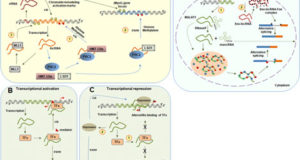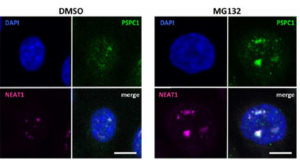lncRNAtor aims to be the lncRNA (long non-coding RNA) portal encompassing expression profile, interacting (binding) protein, integrated sequence curation, evolutionary scores, and coding potential. Data sets were collected from TCGA, GEO, ENCODE, and modENCODE (Organism: Human, Mouse, Fly, Worm, and Yeast). Our system workflow is shown below. lncRNAtor is preparing to submit a paper. (2013.06.03)
Read More »lncRNAtor – Functional Investigation of long noncoding RNAs
lncRNAtor aims to be the lncRNA (long non-coding RNA) portal encompassing expression profile, interacting (binding) protein, integrated sequence curation, evolutionary scores, and coding potential. Data sets were collected from TCGA, GEO, ENCODE, and modENCODE (Organism: Human, Mouse, Fly, Worm, and Yeast). Our system workflow is shown below. lncRNAtor is preparing to submit a paper. (2013.06.03)
Read More »Boston area is leading RNA renaissance
Science is leaping forward, and investors are watching closely from the Boston Globe By Robert Weisman After several years of waning enthusiasm for an approach to drug-making that was once called revolutionary, interest in RNA medicines is suddenly on the upswing, and Boston area start-ups are at the front of the resurgence. The field got a high-octane boost last week ...
Read More »A critical role for the long non-coding RNA GAS5 in proliferation and apoptosis in non-small-cell lung cancer
In recent years, long non-coding RNAs (lncRNAs) have been investigated as a new class of regulators of cellular processes, such as cell growth, apoptosis, and carcinogenesis. Although lncRNAs are dysregulated in numerous cancer types, limited data are available on the expression profile and functional role of lncRNAs in non-small cell lung cancer (NSCLC). In the present study, researchers at the ...
Read More »Featured Long non-coding RNA: GHET1
Long noncoding RNAs (lncRNAs), a recently characterized class of noncoding RNAs, have been shown to have important regulatory roles and are deregulated in a variety of tumors. However, the contributions and functional mechanisms of lncRNAs to gastric carcinoma remain largely unknown. In this study, researchers at the Shanghai Jiao Tong University School of Medicine, China found that lncRNA gastric carcinoma ...
Read More »Functional insights into the role of nuclear-retained long noncoding RNAs in gene expression control in mammalian cells
The mammalian genome harbors thousands of long noncoding RNA (lncRNA) genes. Recent studies have indicated the involvement of several of these lncRNAs in the regulation of gene expression. lncRNAs play crucial roles in various biological processes ranging from epigenetic gene regulation, transcriptional control, to post-transcriptional regulation. lncRNAs are localized in various subcellular compartments, and major proportion of these are retained ...
Read More »Featured long non-coding RNA-ARA: Adriamycin Resistance Associated
Long non-coding RNAs (lncRNAs) are emerging as an integral functional component of human genome and have been investigated as critical regulators in molecular biology of cancer. A recent study reported that lncRNA-UCA1 induced drug resistance in adriamycin chemotherapy. However, the contributions of lncRNAs to adriamycin resistance in cancers remain largely unknown. To address this issue, researchers at the First Affiliated ...
Read More »Featured long non-coding RNA – NEAT1
Paraspeckles are subnuclear structures formed around NEAT1/MENε/β long noncoding RNA (lncRNA). Here a team led by researchers at Hokkaido University, Japan show that paraspeckles became dramatically enlarged following proteasome inhibition. This enlargement was mainly caused by NEAT1 transcriptional up-regulation, rather than an accumulation of un-degraded paraspeckle proteins. Interestingly, however, using immuno-electron microscopy we found that key paraspeckle proteins become effectively ...
Read More »Identification of short-lived long non-coding RNAs as surrogate indicators for chemical stress response
Abiotic and biotic stressors in human cells are often a result of sudden and/or frequent changes in environmental factors. The molecular response to stress involves elaborate modulation of gene expression and is of homeostatic, ecological, and evolutionary importance. Although attention has primarily focused on signaling pathways and protein networks, long non-coding RNAs (ncRNAs) are increasingly involved in the molecular mechanisms ...
Read More » lncRNA Blog lncRNA Research and Industry News
lncRNA Blog lncRNA Research and Industry News



